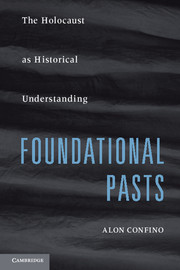2 - A Dominant Interpretive Framework
from Part One - Thinking the Holocaust
Published online by Cambridge University Press: 05 June 2012
Summary
The historiography of the Holocaust in the last decades has been rich, complex, and fragmented into varied fields of research, methods, and languages. But similar to all historiographical bodies of work, it gave rise to several dominant conceptual categories that have informed, often indiscernibly and spanning interpretive differences, historians’ arguments and use of methods; these categories have also created boundaries of interpretive common sense. In this chapter I am seeking these dominant categories. My aim is not to provide a comprehensive historiographical overview, a task that has already been done in exemplary fashion; I therefore do not include all interpretations and points of view. It is also not my intention to focus on specific historiographical debates, however significant. Rather, my aim is to cut through surface debates to the heart of how historians understand, often implicitly, the Holocaust.
To pursue this goal, I enter in this and in the next chapter into a dialogue with Saul Friedländer's magnum opus The Years of Extermination, which is a sort of a summa of Holocaust research and historiography of the last generation and therefore an excellent source from which to identify dominant interpretive categories. The Years of Extermination has been received worldwide as an exemplary study that found the right balance of tone, narrative, and interpretation about the most difficult historical topic of all in the post-1945 period. The book has been a major scholarly and public event partly because it represents the apogee of an era of historical understanding of the Holocaust. The Holocaust, according to Friedländer, was determined by
the centrality of ideological-cultural factors as the prime movers of Nazi policies in regard to the Jewish issue, depending of course on circumstances, institutional dynamics, and essentially…on the evolution of the war.…The anti-Jewish drive became ever more extreme along with the radicalization of the regime's goals and then with the extension of the war. It is in this context that we shall be able to locate the emergence of the “Final Solution.”
- Type
- Chapter
- Information
- Foundational PastsThe Holocaust as Historical Understanding, pp. 37 - 48Publisher: Cambridge University PressPrint publication year: 2011



